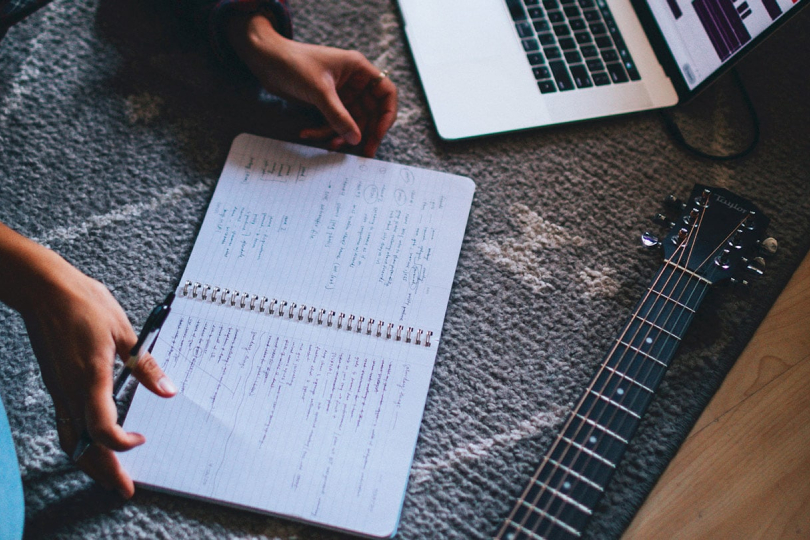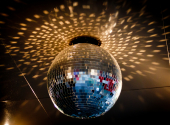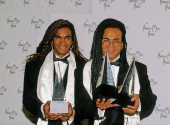
Notes of a Frontwoman #4: Without Songs We Are Nothing
There are few things I love as much as writing songs. It's my safe zone, where it's just me and the lyrics, riffs, melodies, rhythms, creativity, inspiration and euphoria. It's a creative process of sending an idea in my head out to other people. Finding something that one is both good at and passionate about is a huge blessing. And even though the approach to writing changes slightly with age, the joy remains.
No limits
I wrote my first song when I was about eight years old. My friend Žanet (today performing under the name ŽANET) was two years older, we lived in the same neighbourhood and we went to school together every morning. From an artistic point of view, those journeys were very fruitful because they often resulted in lyrics written in my green notebook with squared paper and also in melodies that we enthusiastically recorded on a tape recorder in the afternoon. I didn't know how to play anything except the recorder, but even then I would compose hit songs about all sorts of things.
To this day, I still remember some of those songs and whenever Žanet and I meet somewhere, she never fails to mention how we used to sit on a ping pong table and sing my hit chorus about our home town. There were no limits, my childhood imagination was boundless and it gave me a good foundation for my later years. After all, the song about our town had a total pop hook, and in terms of lyrics, it matched the desired level of mainstream (in)complexity.
Four chords of happiness
I was thirteen years old, I started playing the guitar and discovered an incredible amount of possibilities bounded by the chords C, G, D and A. Why would I practise scales when I could endlessly invent more and more melodies? A new world opened up for me, and with each new chord and improvement in my guitar skills, it expanded and became more colourful.
For the first time, I experienced what it means to get lost in your head and have a seemingly endless amount of inspiration. Almost every new day brought a new song and every new song brought joy. And to really put what I wanted into the lyrics, I kept looking up new English words and phrases, which made my language skills skyrocket.
Eventually, there were so many ideas that I was looking for a way to record them on something other than my cassette recorder... and that's when my dad showed me the recording software which shaped the way I write songs to this day.
3, 2, 1... We're recording!
Roland Cube amp, grandma's living room, I'm sitting on the carpet with an Epiphone guitar in my hand, a blank paper and a pencil next to me. I'm 16 years old. I'm strumming, something's in my head, suddenly it takes a clearer form and the uncertain strumming becomes a riff. My heart beats faster, adrenaline rushes through my veins. I've found that's how I feel when the idea is a good one. And I've also found that the feeling is addictive. I play it over and over again, and the melody of the chorus arrives and joins the riff and the chords. I write the first words of the lyrics as I hear them phrased in my mind. I scratch, change and polish until I'm satisfied. The song is out, it took an hour.
The next day, I'm sitting in my dad's garden shed, which he has turned into a home studio. He taught me how to work with FL Studio, I can click drums in EZ Drummer, and it allows me to mess around with the songs as much as I want. Through trial and error, I'm improving my songwriting. What happens when I reverse this rhythm? How would that transition work? What if I flip these two sections here?
Through weekend recording sessions at my dad's house, I learned to write under pressure and record songs the way they sounded in my head. That was a big shift.
The four of us
Years passed, experience grew. I used to be a soloist and suddenly I jumped into the first, second and then the third band. I didn't play my songs there, though, so my love for songwriting went aside for a while as I honed my stage skills and the art of life on the road with a musical ensemble. That changed when I decided to start my own band, which was to be based on my original repertoire. I found the courage to put myself out there.
Limits came hand in hand with that. I set the boundaries of the genre I wanted to play, and I also had to take into account the preferences and abilities of my bandmates. It wasn't just me anymore, it was the four of us. I was constantly conscious that I was responsible for everything I wrote, so the level of self-censorship rose significantly. I was harder on myself and had immediate feedback from the girls.
Still, our first album almost wrote itself. Some of my original "songs from the shed" were used as a foundation, and I actively wrote others, sometimes with the help of our bassist Katie. We gave ourselves different challenges, for example, we decided that it would be great to write a song whose lyrics made no sense at all.
Literature also helped - the song "She's a Beast" was inspired by Sylvia Plath's novel The Bell Jar. I drew inspiration from everywhere; I already knew that heated situations and emotions are the best breeding ground for strong ideas. And the songs were all around me, one just had to catch them, tame them, shape them...
There is no universal approach
I recently interviewed Lari Basilio and asked her if she had a standard approach to composing. She replied that there is no consistent approach and that her compositions always start differently, and we completely agreed on that.
I often start with a riff, sometimes with a melody and sometimes with a phrase or words that I like. Or a drum groove. I consider myself a latent drummer, so it's always been very nice for me to put together a drum pattern and start playing riffs to it - because rhythm guitar and drums go hand in hand for me.
Other times, our drummer Kajda sends me a collection of her rhythmic ideas, so I can choose what I like. Or I think about how a certain type of drummer might drum my idea and write accordingly.
Tune it down, change the tuning, plug it in differently - and most importantly, record it!
Experimenting with different types of tuning works for me as well. D drop, B drop, C drop, tuning the whole guitar a semitone lower or using a capodaster. All of that can bring new ideas. A different amp sound, a new instrument and a different tempo can be inspiring too.
My phone's voice recorder is full of quietly muttered melodies or drumbeat ideas. Inspiration often strikes me in public and people wonder why the girl on the tram is doing "to-to-tah, tee-dee-dum-tum" on her cell phone. For example, our song "Shoot" exists partially thanks to the dictaphone. I got the idea when I was in bed, so I reached for my phone, hummed something in it and fell asleep. In the morning, I was so surprised that I almost spit out my coffee when I played the recording and heard myself half-asleep grunting: "Bass drum plays quarter notes, 160 BPM," and then singing the whole chorus, including the words. The phone's Notes feature is also very useful - I alternate pieces of lyrics with shopping lists. "Milk, tofu, toilet paper!" would not make a good song, though.
And finally, sometimes I turn to my acoustic guitar for help. It doesn't forgive me anything, it exposes the song completely and only then it becomes clear whether it is good or not. I had a short period when I wanted to try something new and I wrote acoustic songs in my native language, purely to see if I could do it. Again, it taught me something and showed me new techniques and ways to go. Moreover - it may surprise some people - you can compose a proper metal song on an acoustic.
Shower tests and test audience
In English, it is known as "the old grey whistle test". Once upon a time, whenever a new song was released, the first people to hear it were the doormen who wore grey suits. The song was played once or twice and if the doormen whistled the tune, the song passed the old grey whistle test and had some potential.
For my purposes, I adapted this strategy to the shower test. I wrote a piece of a song and either sang it, whistled it or hummed it into a tape recorder or recorded it into a program. Then I left it alone. If that piece played in my head while I showered the next morning, I knew it was worth working on the idea further. I have been using this method to this day and the water bills have been fine so far.
If the idea passes the first round and I turn it into a song, I send it to my test audience for review. Apart from the girls in the band, this consists of people who I know will give me completely honest feedback. Some of them are musicians, others are not, which is also helpful – they evaluate the song purely as listeners, just looking at whether they like it or not. I'm already too biased at that point, I have a certain emotional attachment to each song and I lack distance and sometimes judgement. So the test audience feedback is extremely important to me.
Shooting inspiration, make a wish
Sometimes it just doesn't happen. Even when it seems like there are hundreds of ideas flying right above you, you can't raise your hand and grab them, or your head is just all blank and silent. Sometimes it takes time and patience, other times it helps to throw yourself against the wall and try hard. I once sent the rest of the household on a trip, saying I needed to write the last song for an EP - I didn't believe it myself, but when they came back it was done. Also, new insights, new influences, new experiences, all of that can get the inspiration moving again. The trick is to know which way is best at the time.
Songwriting is a combination of several aspects: creativity, talent and craft. Talent is something that can't be taught or bought. It can only be developed. Creativity cannot be turned off and on, but it can be encouraged. Craft can help you give things certain stylistic qualities and order, it can guide you in a way. It can also help you know in advance which procedures work better and which work worse or not at all.
The album as a jigsaw puzzle
To conclude this collection of reflections on the joys and sorrows of composing music, I would like to say that, as always and in everything, age takes something away and gives something else. I've long since lost the ability to write songs every day. The spontaneous flow of natural creativity, which one doesn't think about and just acts on it, doesn't come that often. I think more when composing, the constant rush of screaming and energy has been replaced by dynamics. When we put songs together for an album, I can see more clearly what types of songs we have and which ones would fit in there to make the record complete.
While my approach has changed a bit, what hasn't changed is the fact that composing makes me happy. When I hear new songs for the first time in a studio version, or see the audience singing and reacting to them at a concert, it's an indescribable feeling that drives me forward and motivates me. At that moment, I'm grateful to have discovered this talent of mine and to be a musician. Without songs, we are nothing.
If you have found an error or typo in the article, please let us know by e-mail info@insounder.org.




